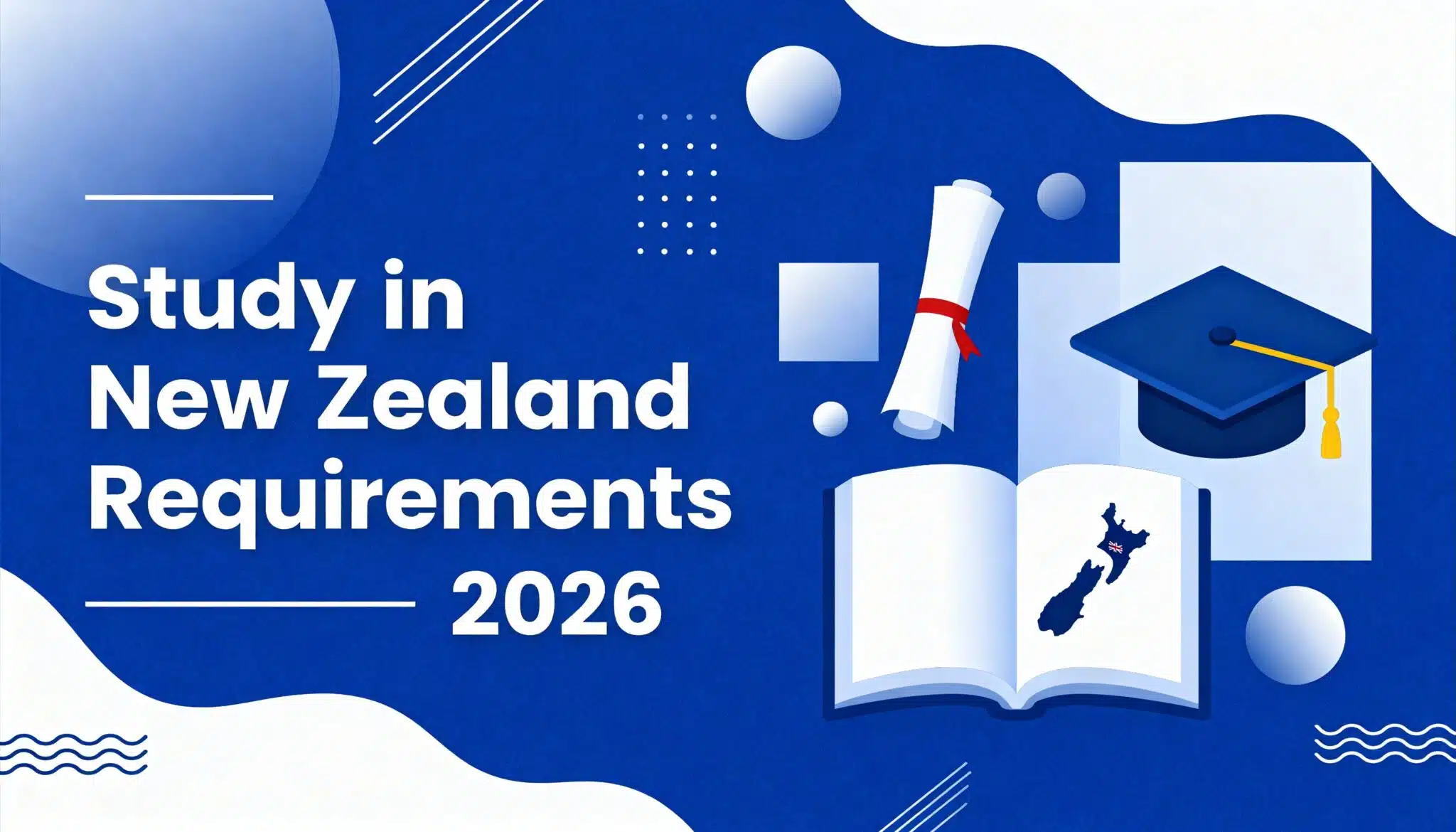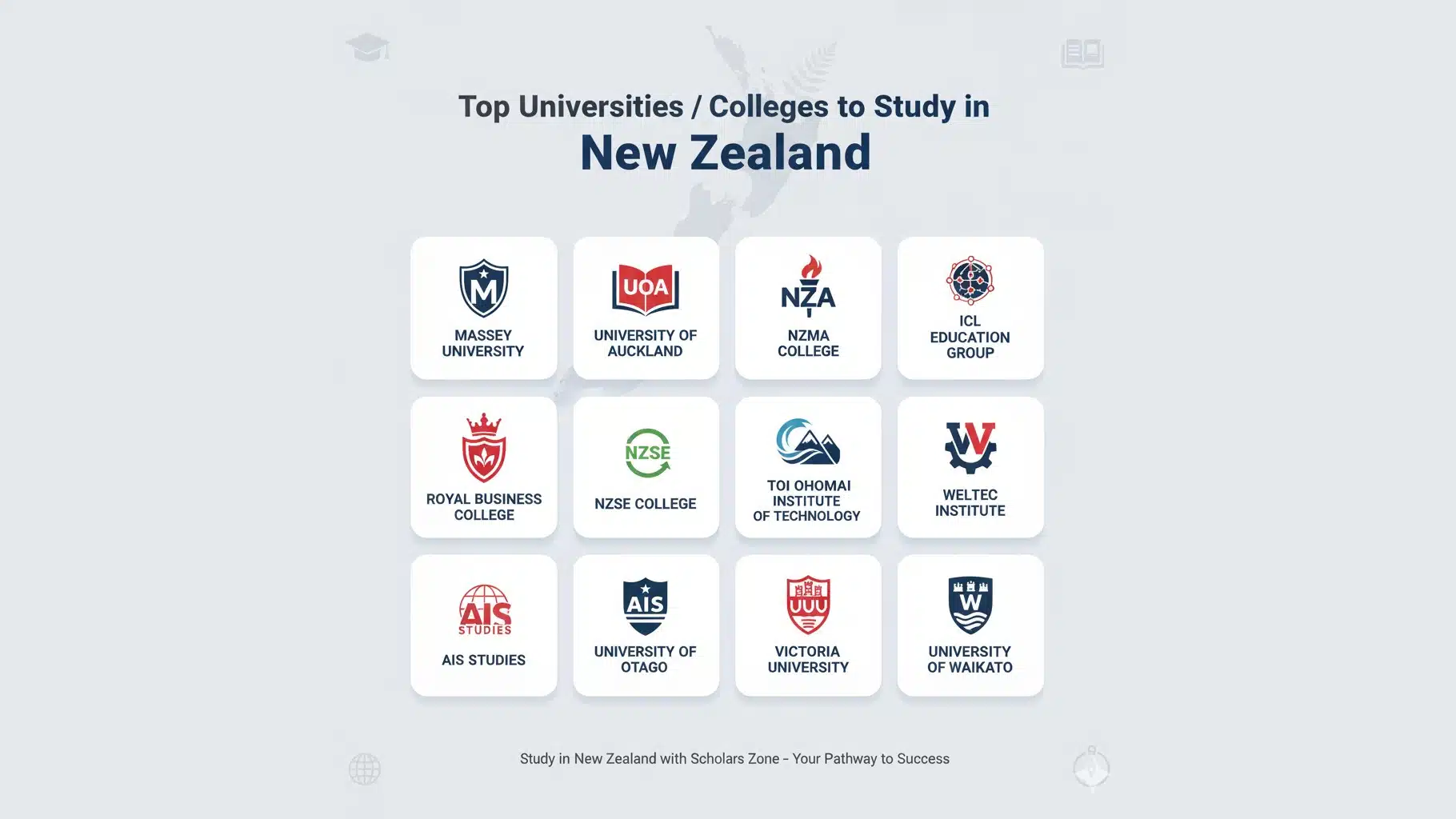New Zealand has become one of the most popular destinations for international students seeking a world-class education, affordable tuition, and career opportunities after graduation. For Bangladeshi students and others around the world, understanding the study in New Zealand requirements is the first step toward achieving that dream.
This complete guide explains everything you need to know about requirements, tuition fees, scholarships, living costs, and top universities—helping you plan your journey confidently.
Why Study in New Zealand?
New Zealand’s education system is ranked among the best globally. It combines academic excellence, research opportunities, and real-world experience in a safe and welcoming environment.
Here are the top reasons to study in New Zealand:
-
Degrees recognized worldwide.
-
Affordable tuition and reasonable living costs.
-
Post-study work visa up to 3 years.
-
Pathway to permanent residency (PR).
-
Hands-on, practical learning approach.
-
Multicultural society with an English-speaking environment.
General study in New Zealand requirements
In New Zealand as an international student before applying, you must meet a few essential requirements for your chosen program level — whether schooling, undergraduate, postgraduate, or research.
1. Academic Requirements
| Program Level | Minimum Academic Requirement |
|---|---|
| Schooling (K–12) | At least 8–10 years of schooling |
| Foundation / Diploma | 12 years of education (HSC or equivalent) |
| Bachelor’s Degree | Completed HSC or A-Level with GPA ≥ 4.0 |
| Master’s Degree | Bachelor’s degree with at least 60% marks |
| PhD | Master’s degree and strong research background |
Universities may have specific entry standards depending on the field of study (e.g., engineering, medicine, or business).
2. English Language Requirements
All international students must prove English proficiency through one of the following tests:
| Test | Undergraduate | Postgraduate |
|---|---|---|
| IELTS | Overall 6.0 (no band below 5.5) | 6.5 (no band below 6.0) |
| TOEFL iBT | 80 | 90 |
| PTE Academic | 50 | 58 |
Some schools, polytechnics, and universities may accept Medium of Instruction (MOI) certificates in specific cases.
3. Document for study in New Zealand requirements
When applying for admission to a New Zealand university or college as international students, prepare the following:
-
Academic transcripts and certificates.
-
Valid passport.
-
English language test score (IELTS, TOEFL, or PTE).
-
Statement of Purpose (SOP).
-
Letters of Recommendation (LORs).
-
Updated CV/resume (for postgraduate students).
-
Proof of funds (for visa purposes).
-
Medical and police clearance certificates.
Tuition Fees for Studying in New Zealand
Tuition fees vary depending on your level of study and the university you choose.
| Program Level | Average Annual Tuition (NZD) | Approx. in BDT |
|---|---|---|
| Schooling (K–12) | 12,000 – 18,000 | 850,000 – 1,250,000 |
| Diploma Programs | 15,000–20,000 | 1,050,000–1,400,000 |
| Bachelor’s Degree | 22,000 – 32,000 | 1,540,000 – 2,240,000 |
| Master’s Degree | 26,000 – 37,000 | 1,820,000 – 2,590,000 |
| PhD | 6,000 – 9,000 (Domestic rate for all) | 420,000 – 630,000 |
Most PhD students pay domestic tuition fees, making it one of the most affordable study options worldwide.
Cost of Living in New Zealand
To study in New Zealand, international students must show proof of NZD 20,000 per year to cover living expenses.
| Expense Type | Monthly Cost (NZD) |
|---|---|
| Accommodation | 800 – 1,200 |
| Food & Groceries | 300–500 |
| Transport | 100–150 |
| Internet & Utilities | 100–150 |
| Miscellaneous | 200–300 |
Total annual living expenses typically range between NZD 15,000 – 20,000.
Scholarships for Studying in New Zealand
New Zealand offers numerous scholarships for international students, including Bangladeshi students.
1. Manaaki New Zealand Scholarships (Government-Funded)
-
Full tuition + living allowance + travel costs.
-
Available for undergraduate and postgraduate degrees.
2. University of Auckland International Excellence Scholarship
-
Up to NZD 10,000.
-
Based on academic achievement and leadership qualities.
3. Victoria Tongarewa Scholarships
-
Partial scholarships (NZD 5,000–10,000).
-
Available for undergraduate and master’s students.
4. University of Otago International Master’s Research Scholarship
-
Covers full tuition and stipend.
5. Lincoln University International Taught Master’s Scholarship
-
Covers up to 50% of tuition fees.
Tip: Start your scholarship search early—most awards require applications months before the academic year begins.
Top Universities in New Zealand
All eight New Zealand universities are publicly funded and globally ranked for quality and innovation.
| University | QS Ranking 2025 | Top Courses |
|---|---|---|
| University of Auckland | 65 | Engineering, Business, Medicine |
| University of Otago | 206 | Health Science, Research |
| Victoria University of Wellington | 241 | Law, Humanities, Communication |
| University of Canterbury | 256 | Engineering, Environmental Studies |
| Massey University | 239 | Agriculture, Food Science, Business |
| University of Waikato | 250 | Computer Science, Management |
| Lincoln University | 362 | Agribusiness, Environment |
| Auckland University of Technology (AUT) | 407 | Design, Media, Technology |
Schooling and Foundation for study in New Zealand requirements
For younger students (grades 1–13), international schools in New Zealand provide top-quality education and English support.
-
Tuition Fees: NZD 12,000–18,000 per year.
-
Medium of Instruction: English.
-
Foundation Programs: Offered after high school to prepare for bachelor’s degrees.
Job Opportunities for International Students
Working while studying is a great way to gain experience and manage expenses.
-
Part-time work: 20 hours per week during semesters.
-
Full-time work: During holidays.
-
Post-study work visa: 1–3 years depending on qualification.
High-Demand Fields in New Zealand:
-
IT and Software Development
-
Engineering (Civil, Electrical, Mechanical)
-
Healthcare and Nursing
-
Agriculture and Horticulture
-
Accounting and Business Management
Graduates in these sectors often qualify for Permanent Residency (PR) under the Skilled Migrant Category.
Visa Requirements for Studying in New Zealand
To get a New Zealand student visa, you must provide:
-
Offer of Place from a recognized institution.
-
Valid passport.
-
Proof of sufficient funds (NZD 20,000 per year).
-
Health and police clearance certificates.
-
Tuition fee payment receipt.
-
Proof of English proficiency (IELTS/TOEFL/PTE).
The visa process usually takes 4–6 weeks depending on your application’s completeness.
Final Thoughts
Meeting the study in New Zealand requirements is the first step toward an extraordinary academic and professional journey. With globally ranked universities, diverse scholarship opportunities, affordable costs, and excellent post-study work options, New Zealand is one of the most student-friendly countries in the world.
If you’re a Bangladeshi student looking to take the next step in your educational journey, start preparing early—research programs, take your IELTS, and plan your finances wisely. Your future in New Zealand awaits!
Need Help Applying?
At Scholars Zone, we specialize in placing Bangladeshi students in affordable New Zealand universities that offer scholarships, PGWP benefits, and PR potential.
📌HEAD OFFICE: House – 27/A, Rd No. #03, Dhadmondi, Dhaka – 1205.
🌐 Website: www.scholarszone.com.bd
📞 Phone: +88 01714-076485
📧 Email: contact@scholarszone.com.bd





